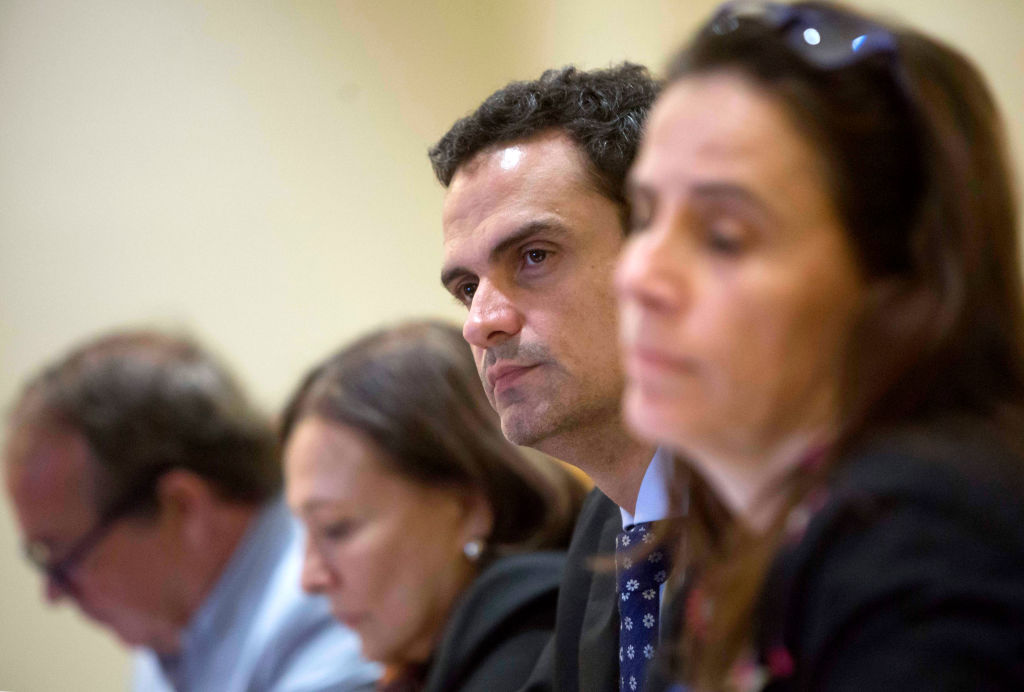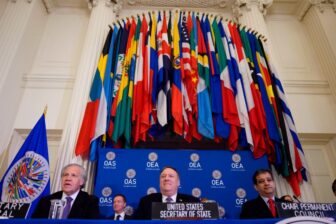The inter-American human rights system has long been the last hope of victims in the region, who have often struggled unsuccessfully for years to see their rights upheld in domestic judicial systems. They deserve a regional system that can protect fundamental rights and freedoms without political interference. This essential principle is in jeopardy.
Having worked at the Inter-American Commission on Human Rights (IACHR, or CIDH for its acronym in Spanish and Portuguese), we both know that the backlog in processing cases can be frustrating for victims. But we have also seen first-hand – from within the system and as human rights defenders operating outside of it – the enormous contribution that the IACHR has made to bolster human rights in the region since its establishment in 1959.
But now the commission’s independence is under threat. OAS Secretary General Luis Almagro has broken with decades of practice by refusing to confirm Paulo Abrão, the candidate the commission unanimously selected as its executive director for a second term, without even consulting with the commission, as the OAS charter requires.
This move has received widespread condemnation from the human rights community in the region, as well as from UN High Commissioner for Human Rights Michelle Bachelet. The commission has by far been the most relevant human rights body in the Americas for decades, both through its consideration of individual cases and through its in-country visits. The notable 1978 visit to Argentina that documented and exposed disappearances and torture during its bloody military dictatorship is just one example. The commission selects the cases it will litigate before the Inter-American Court of Human Rights, whose binding rulings have strengthened universal human rights standards thanks to their impact on policies, legislation and government practice.
In turn, these rulings often spur much-needed debates critical for rights-protective reforms, not only in the country that has to comply with them, but in other countries as well. One example is its rulings that amnesty laws – which prevented investigations, prosecution and punishment of egregious human rights violations committed during Latin America’s dictatorships – violated victims’ rights to access justice. The rulings opened the door for accountability for atrocities committed, for example, by Augusto Pinochet in Chile and by Alberto Fujimori in Peru, establishing jurisprudence that was later cited by Argentina’s Supreme Court to overturn amnesty laws there. These results would have been impossible without the commission’s initial intervention.
The commission has also been challenging the misuse of military justice, which has been an obstacle to accountability in the entire region. In countries like Mexico, for instance, where the military has been deployed in law enforcement and counter-narcotic operations, military judges and prosecutors were responsible for prosecuting and trying military abuses. The result was widespread impunity. After the IACHR took the case of an activist who was arrested and forcibly disappeared by Mexican armed forces to the Inter-American Court, the tribunal ruled that military courts could not guarantee independent investigations or effective remedies to victims of military abuse. Due to that ruling and enormous internal and international pressure, Mexico modified its Code of Military Justice to exclude military jurisdiction for the gravest human rights crimes.
The Office of the Special Rapporteur for Freedom of Expression, an independent expert working within the IACHR, has strengthened free speech and access to public information protections in the region. One notable result was the development of standards to limit laws criminalizing defamation. In a settlement facilitated by the commission, Argentina agreed to abolish the broadly defined offense of “contempt” from its criminal code after a journalist was convicted under it for writing an article criticizing a Supreme Court magistrate. The decision was based on the concept that public officials should be subject to greater scrutiny to protect free speech.
The IACHR has also played an essential role protecting the rights of lesbian, gay, bisexual and transgender (LGBT) people. A major example was the case of a lesbian mother denied custody of her daughters by Chile’s Supreme Court because of her sexual orientation. The commission found Chile responsible for discriminatory treatment and arbitrary interference in her private and family life, and it took the case to the Inter-American Court when Chile failed to comply with its decision. The court ruled that sexual orientation is protected by the right to equality and non-discrimination and has no bearing on determining “good” or “bad” parenthood. Chile complied with the ruling.
In recent years, the IACHR has played an important role exposing ongoing abuses. It conducted a fact-finding mission to Nicaragua that led to the creation of a special monitoring system to document human rights violations during that country’s 2018 crackdown on dissent. Its comprehensive and independent reporting led the government to expel the monitors, but the government was unable to hide its abuses.
Also in 2018, the commission’s involvement after the killing of two Ecuadorean journalists near the Ecuador-Colombia border led to the establishment of a bi-national team to investigate the case. In 2014, the commission created a special team of independent experts to thoroughly investigate the disappearance of 43 students in Ayotzinapa, Mexico, which resulted in a strong report that exposed mediocre and abusive investigations and a cover-up.
The commission’s injunctions – that is, orders issued to governments to ensure that the lives or rights of people at imminent risk are protected – have helped victims including human rights defenders and journalists under threat. Its public hearings also help bring to light abuses faced by victims throughout the region.
Friendly settlements between petitioners and states, brokered and monitored by the commission, have allowed victims to obtain reparations for human rights violations, including access to adequate housing and health care. In addition, some of the cases have led to major policy changes that have helped protect millions of people. In the Maria da Penha case, for example, the commission held that Brazil had violated the rights to judicial protection and to equality before the law of a Brazilian woman who had survived two homicide attempts by her husband. The decision underscored that domestic violence is a human rights violation and led to the adoption of comprehensive and modern legislation aimed at preventing and punishing domestic violence in Brazil and protecting the right of women and girls to live free from violence.
This advocacy has, predictably, generated serious hostility from governments of all political tendencies.
In 2012, then Ecuadorean president Rafael Correa spearheaded a campaign with the support of the Bolivarian Alliance of the People of our Americas (ALBA) to undermine the inter-American human rights system. The proposal would have seriously limited the commission’s ability to issue injunctions and the Office of the Special Rapporteur for Freedom of Expression’s ability to publish its own reports and obtain funding, at a time when the office had criticized Ecuador and Venezuela’s measures that undermined free speech. A strong reaction by human rights groups and a handful of OAS member states stopped them, though the commission ended up modifying its rules of procedure to reduce the circumstances in which it could issue injunctions.
Years later, in 2019, Argentina, Brazil, Colombia, Peru and Chile proposed changes to “improve” the commission through a declaration based on an archaic defense of the principle of national sovereignty. They held that the inter-American system’s bodies should respect the “legitimate space of autonomy of the States.” Some of those governments backtracked after human rights groups publicly challenged them.
The recent OAS secretary general decision looks like another effort to undermine the commission’s independence. While the commissioners only devote part of their time to their roles, the executive secretary’s full-time job is to carry out the everyday work of the commission. Whoever is appointed to this position requires the full confidence of the commissioners, who act in their personal capacity and do not represent states. This latest challenge would reverse a practice of over 20 years whereby the commission independently selects and appoints its executive secretary and special rapporteurs. These officials are selected based on their credentials and expertise and they are not political appointees. In the only previous instance in which an OAS secretary general attempted to interfere with the commission’s decision to appoint an executive secretary, a special rapporteur, and another high-level official in 2004, he swiftly backtracked after a strong reaction by OAS member states and human rights groups.
Almagro said his decision was based on “dozens” of “serious” management complaints by OAS employees included in a confidential report by the OAS ombudsperson, who does not have the authority to investigate individual cases. The alleged complaints have not been substantiated.
Any serious allegations of improper conduct involving the IACHR should be thoroughly and impartially investigated. But the way the secretary general has gone about taking this decision – and the IACHR’s response explaining its response to the allegations – raise serious concerns that this is a pretext to undermine the autonomy and credibility of the commission.
There are, of course, many measures that could and should be considered to improve the inter-American human rights system, including, for starters, ensuring sufficient resources to address the huge backlog of cases that has delayed victims’ access to reparations for years. But one thing is clear: a power struggle that undercuts the commission’s independence does not serve that purpose. On the contrary, it risks undermining the only hope that many abuse victims in the Americas have left.
—
Vivanco is Americas director and Taraciuk Broner is Americas deputy director at Human Rights Watch.








